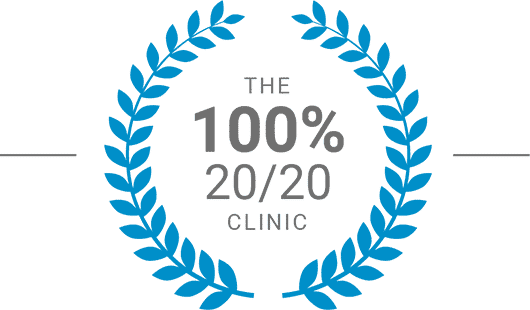Book Your Free Consultation
Mr David Allamby
MD, FRCOphth, FRCS
If you have astigmatism, you might think that you'll need to spend the rest of your life wearing glasses or contact lenses to correct your vision.
Many people believe that refractive surgery, such as laser eye surgery, is unable to correct astigmatism, but fortunately, this isn’t true.
Excimer lasers have been able to correct these refractive errors for around 20 years, meaning that laser eye surgery is a viable option for patients with astigmatism.
Astigmatism is a type of refractive error that causes blurry vision.
In a normal eye, the light enters through the cornea and passes through the pupil, continuing through the lens that's located just behind the iris.
The cornea and lens focus the light into a single point on the light-sensitive tissue on the back of the eye, which converts the light into information that passes along the optic nerve to the occipital lobe within the rear part of the brain where it is then processed into a clear image.
With astigmatism, the eye has an asymmetrical shape, being shaped like a rugby ball instead of a football, which causes light to focus at multiple points, causing blurred vision or distorted vision.
There are two different types of astigmatism:
An ophthalmologist or eye doctor will typically be able to diagnose astigmatism during a regular eye check-up and will advise you on how to correct the refractive error.
Usually, treating astigmatism involves the prescription of glasses or contact lenses, but it's also possible to treat astigmatism with laser eye surgery.
In the early days of laser vision correction procedures, astigmatism could not be corrected, but with developments in the technology and processes involved, this is no longer the case.
However, despite these advances, the perception that laser eye surgery can't treat patients with astigmatism has persisted over the past 2 decades.
It's possible to correct any astigmatism in your prescription with a high degree of accuracy, even up to 6 dioptres.
LASIK, or laser-assisted in-situ keratomileusis, is the most common type of laser eye surgery used, but in some cases, LASEK/PRK surgery may be used.
When treating astigmatism with LASIK, a femtosecond laser is used to create a circular flap in the uppermost layer of the cornea.
This flap is folded back to allow a second excimer laser to make the correction, reshaping the cornea by evaporating microscopic amounts of collagen tissue in just a few seconds, before the flap is then folded back into its original position.
Thanks to the precision of the lasers, the surface skin cells of the cornea will re-seal the flap created during the procedure in just 4 hours.
The reshaping of the corneal tissue changes the focal point of the eye, reducing the number of focal points and reducing the blurriness of the patient's vision.
To correct long-sightedness, also known as hyperopia, the cornea is made steeper by removing more tissue from the outer edges of the cornea.
To correct short-sightedness, or myopia, the cornea is made flatter by removing more tissue from the middle of the cornea.
Despite sounding like a relatively complex procedure, the technology means that the average treatment time is around 4 minutes per eye.
For high levels of astigmatism, a refractive lens exchange, or intraocular lens surgery, is another option for treatment.
During this treatment, the eye's natural lens is replaced with a new artificial lens, which can be either a monofocal lens, to correct for distance vision, or a toric lens, which corrects both distance vision and astigmatism.
Intraocular lens surgery (IOL) is a common procedure that has a high success rate and is usually performed by a laser eye surgeon under local anaesthetic, taking around 15 minutes per eye.
Using laser eye surgery to treat astigmatism is incredibly safe, as there is an extensive screening process to make sure each and every patient is a suitable candidate for the procedure.
In fact, it's one of the safest surgical procedures in the world, but there is still a level of risk involved, as is the case with any surgery.
At Focus Clinics, we use a WaveLight laser, which is one of the most precise machines available, and 100% of our patients are discharged with 20/20 vision or better.
Most patients have 20/20 vision, which is one of the highest levels of visual acuity, within 30 minutes of the end of the procedure, and the eyes are comfortable with vision clear approximately 4 hours after surgery.
Focus is one of the leading laser eye surgery clinics in the UK, so to find out if you're a good candidate for laser eye surgery to correct your astigmatism, submit your details and a member of our team will be in touch to discuss your situation as part of a free telephone consultation.
Book a FREE* Consultation
To get a better idea of how we can help you, and also the different types of services we offer, book a consultation now.

100% 20/20 vision
Focus Clinic has a remarkable 100% success rate for 20/20 vision. We know of no other clinic that has matched these results. There is a big difference between, for example, 98% and 100% success, especially if you are in the 2%.

10 year guarantee
Your 10 Year Guarantee means you can return at any time if you have additional questions on the quality of your vision. If you have distance vision correction for short-sight then any repeat laser eye treatments to correct a return of myopia in the first 10 years are included free of charge.*

Most trusted eye treatment clinic
We have the highest trust rating of any ‘eye treatment’ rated clinic, according to independent review site TrustPilot. With an outstanding 9.9 out of 10, when it comes to your eyes, choose the clinic that actual patients trust the most.
*Terms and conditions apply, excludes any age-related changes and conditions unrelated to the primary treatment